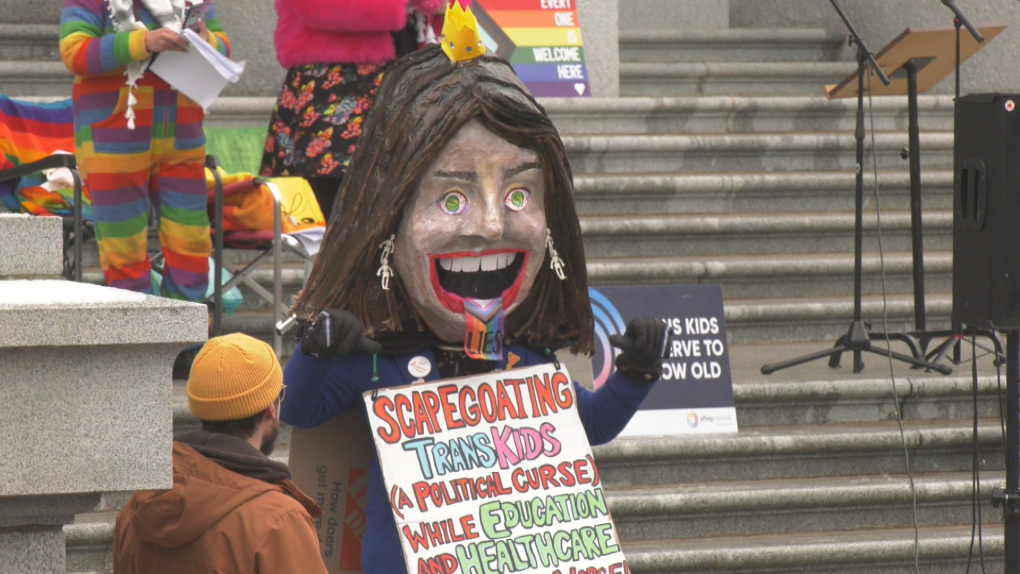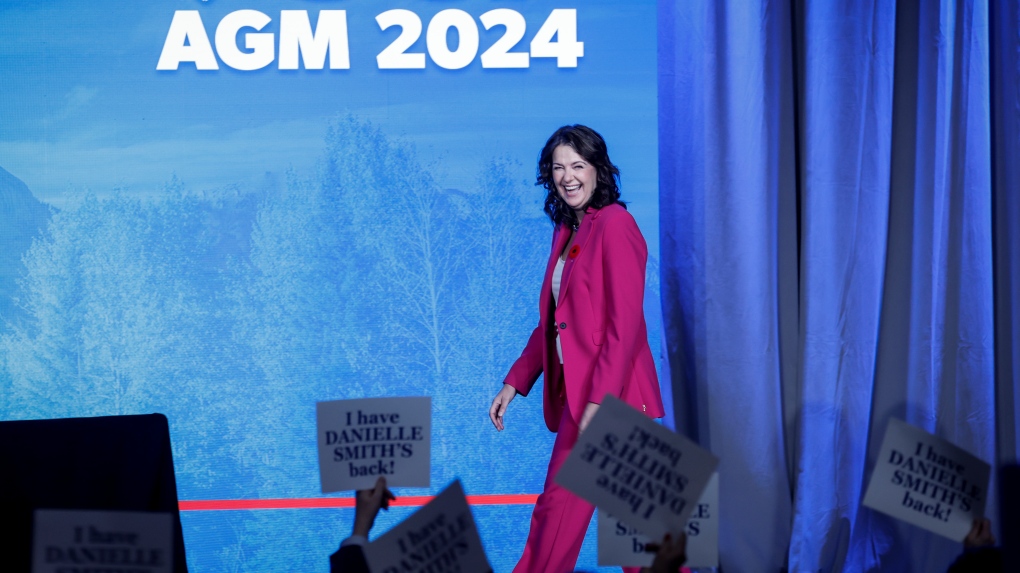'She's very good at politics': Analyst says Alberta's 2024 bills designed for Smith leadership success
 Delegates gather at the United Conservative Party annual meeting in Red Deer, Alta., Saturday, Nov. 2, 2024. (Jeff McIntosh)
Delegates gather at the United Conservative Party annual meeting in Red Deer, Alta., Saturday, Nov. 2, 2024. (Jeff McIntosh)
For one political expert, 2024 was all about the base in Alberta.
While affordability and cost of living were top of mind issues in the province – and across the country – Premier Danielle Smith spent the year focused on policies she claimed would "protect" Albertans' rights.
"I was really surprised that they didn't bring in any measures to address the core issues of affordability," said political analyst John Brennan.
"Even their proposal on car insurance is actually going to lead to an increase in car insurance in the short term, with the hope that … somehow premiums are going to come down down the road."
The big bills
Smith started the year with a bombshell.
At the end of January, the premier announced a controversial set of policies aimed at transgender and non-binary youth.
Despite ongoing protests and condemnations of the policies, Smith has maintained they are to protect the rights of young people.
"Prematurely encouraging or enabling children to alter their very biology or natural growth, no matter how well intentioned and sincere, poses a risk that I as premier am just not comfortable with permitting in our province," she said.
Now law, those policies limit access to certain gender-affirming medical treatments, prevent transgender athletes from competing in female sporting divisions, and require parental consent for pronoun or name changes at school for students under 16.
The legislation has faced ongoing criticism from medical experts, educators and advocates, who have repeatedly questioned the need for such sweeping legislation aimed at less than 0.4 per cent of the province.
- Alberta doctor says Smith's new gender policies based on 'ideology, lack 'medical expertise'
- Edmonton pediatrician says Smith 'drumming up fear' with new policies on trans health care
- Doctors call out contradictions in UCP gender policies, say policies create 'culture of fear'
- LGBTQ+ groups pushing for speedy court process, halt to Alberta transgender bill
The feds called the policies "draconian," with Prime Minister Justin Trudeau saying they were "the most anti-LGBT policies" in Canada.
 An effigy of Alberta Premier Danielle Smith can be seen at a rally for trans rights in Edmonton on Nov. 2, 2024. (Galen McDougall/CTV News Edmonton)
An effigy of Alberta Premier Danielle Smith can be seen at a rally for trans rights in Edmonton on Nov. 2, 2024. (Galen McDougall/CTV News Edmonton)
The issue was one of many Alberta and Ottawa would disagree on over the year.
In April, Smith ushered in a gatekeeper bill requiring municipalities and post-secondaries to get provincial approval before receiving federal funding.
The premier said the bill was needed to prevent Ottawa from funding ideological priorities, such as green power mandates, while critics accused it of being political interference and running contrary to Alberta's red tape reduction goals.
Provincial-municipal relations suffered a second blow a few weeks later with the introduction of Bill 20.
In it, cabinet was given power to veto local bylaws and remove elected council members, and political parties were added to local ballots in Edmonton and Calgary for the next election.
The bill also banned the use of electronic tabulators despite the minister of municipalities admitting there were no known issues with their use.
"If you talk to Albertans, you will find a number of them that don't have faith in machines counting ballots," McIver said shortly after the bill was announced.
"The most important point, if you don't mind my saying, is not whether the machines are good or not. The most important point is whether people believe the machines are OK or not."
While the province claims the bills would increase transparency in local elections, critics accused it of being "authoritarian," "undemocratic" and "complete garbage."
- 'It changes the nature of politics': RMA wary of Bill 20 impact
- 'Disturbing' and 'deeply concerning': Edmonton mayor, councillor worried about Bill 20 spending rules
- 'Kiss of death to local representation': Calgary mayor reacts to Bill 20
"(It's) an attack on local democracy, an attack on local governments ability to represent their constituents," Edmonton Mayor Amarjeet Sohi said.
"This is literally the worst thing I have ever seen the government do to municipalities ever in 18 years," said Paul McLaughlan, then-president of Rural Municipalities of Alberta.
Leadership review
Neither transgender issues nor municipal oversight were among the United Conservative Party's (UCP) pre-election promises.
Neither were amendments to the provincial Bill of Rights, which were announced shortly before the UCP annual general meeting in November.
Those amendments bolster the rights for property and gun owners, expand protection for freedom of speech and prevent anyone from being pressured into getting vaccinated.
- Proposed Alberta Bill of Rights changes aim to protect freedom to refuse vaccines, medical treatment
- Former deputy premier calls Bill of Rights changes 'a mockery'
"I've said this before and I'll say it again, the jury is out with regards to Danielle Smith, whether she's good at governing, but she's very good at politics," Brennan said.
"And what we saw in the six months leading up to the leadership review vote in November was a constant pandering to the base of the United Conservative Party."
Smith's review was a resounding success, with the leader scoring a 91.5 per cent approval rating from her party.
 United Conservative Party leader Danielle Smith walks on stage to address party members at their annual meeting in Red Deer, Alta., Saturday, Nov. 2, 2024. (Jeff McIntosh)
United Conservative Party leader Danielle Smith walks on stage to address party members at their annual meeting in Red Deer, Alta., Saturday, Nov. 2, 2024. (Jeff McIntosh)
Across the province, she has proved consistently less popular.
A Dec. 12 poll from the non-profit Angus Reid Institute found Smith holding steady at around 45 per cent approval – down just one percentage point from September 2023.
Brennan expects Smith, now secure as leader until at least 2027, will spend more time on more centrist policies in the new year.
"She doesn't face the party again for three years, and conveniently, that will be the month after the next election," Brennan said. "I don't expect we're going to see the same pandering.
"What I do expect we're going to see for the rest of this calendar year and going into the new year, is this real strong stance against the federal Liberal government."
"When she's standing up for the oil-and-gas industry on things like emissions cap and the Impact Assessment Act, that's also very popular from the policy point of view going back to the red meat for the base for more, I guess, regular conservatives."
Conspicuously absent from this year's announcements, Brennan points out, was the tax cut promised by the party during the 2023 election – despite the province boasting a $4.6-billion surplus.
He said Smith and her party are likely to use some of that surplus to make good on their big campaign promise leading up to the next election.
"She has three years in the lead up to the next election to do these things, to address the issues of affordability and health care," Brennan explained.
"I expect next spring that we're going to see the beginnings of the income tax cut … It wouldn't surprise me if Nate Horner, in his budget next February, announces a one-per-cent cut, say, in 2025, with another one-per-cent cut in 2026," he continued.
"Then they go into the election in 2027 and say, see, we've delivered the income tax cut."
With files from CTV News Edmonton's Chelan Skulski
CTVNews.ca Top Stories

DEVELOPING Ukrainian drone attack was underway before Azerbaijani plane crashed, Russian aviation chief says
Russia's aviation chief said Friday that a Ukrainian drone attack was underway in the Russian region that an airliner was destined for before it diverted and crashed earlier this week.
Another stowaway is caught on a Delta flight this holiday season – raising major concerns about airport safety
Yet another stowaway managed to board a major airline’s plane – renewing serious questions and concerns about airport safety during the busiest travel season of the year.
What Canada can learn from Trump's 2024 presidential campaign
Donald Trump smiled wide in front of cheering supporters after millions of Americans went to the polls, choosing the divisive Republican leader as the next president of the United States in an astonishing comeback that signalled an American turn to isolationism, protectionism and tariffs.
LeBlanc, Joly to meet with incoming Trump administration officials in Florida
Finance Minister Dominic LeBlanc and Foreign Affairs Minister Mélanie Joly are in Florida to meet with officials from president-elect Donald Trump's incoming administration.
Northern Ont. police shoot man carrying a shotgun on Hwy. 11/17
The province’s Special Investigations Unit is investigating after a police office near Thunder Bay, Ont., shot and wounded a man who fired on a police cruiser with a shotgun.
Bloc Quebecois as official Opposition? Leader says Canadians 'don't have to fear us'
Bloc Quebecois Leader Yves-Francois Blanchet says he's staying modest about the prospect of his party forming official Opposition in the next federal election, though it would be a 'spectacular' result.
9-year-old girl dead in Calgary Boxing Day crash
A nine-year-old girl has died in hospital after the vehicle she was in was struck by a stolen vehicle fleeing from police.
B.C woman awarded nearly $750K in court case against contractor
A B.C. woman has been awarded nearly $750,000 in damages in a dispute with a contractor who strung her along for a year and a half and failed to complete a renovation, according to a recent court decision.
Japan's scenic hot springs town restricting tourists amid fights over the best photo spots
Ginzan Onsen, a popular Japanese hot spring town known for its scenic snowy views, has begun limiting entry to day trippers during winter peak season.

































